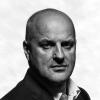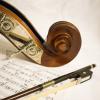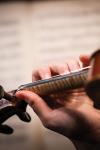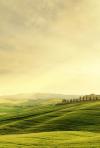Die Schöpfung
Thunder and lightning, birds singing and lions roaring: the creation of the world, set to music by Haydn.

‘… And there was light!’ – in the dark days before Christmas, Joseph Haydn tells us in Die Schöpfung about the creation of a new world. ‘I will not hear such a beautiful piece of music again for as long as I live,’ wrote one of Haydn’s contemporaries. ‘The music described thunder and lightning, you could hear the rain falling and the water rippling, the birds singing and the lion roaring... I have never before left a theatre so contented.’
Programme & performers
Haydn
Die Schöpfung
An hour prior to these concerts there is a concert introduction in the Van Cappellenzaal.




As many know, the attribute of any Christmas pastime is attending concerts with classical music. This season the Rotterdam Philharmonic orchestra presents a true masterpiece of orchestral repertoire - Die Schöpfung by Joseph Haydn. Alone or with company, we invite you to listen to one of the greatest pieces of 18th century music under the baton of Jan Willem de Vriend.
What is Die Schöpfung about?
Die Schöpfung translates from German as The Creation. The title speaks for itself, the narration goes about the creation of the world as described in the Book of Genesis. The libretto combines three sources: Genesis, Book of Psalms and Milton's epic poem – Paradise lost. This piece is composed in the form of an oratorio, an extensive musical composition, combining a choir, soloists, and orchestra. The 2-hour masterpiece belongs to the grander works of 18th century classical music.
In the first two parts of Die Schöpfung, the music depicts the formless chaos, followed by six days of creation: the melody of sharp chords grows into fluid harmonies portraying each new part. Part Three starts with the story of Adam and Eve, the first morning in Eden. The music culminates in the triumphant chorus praising their happy union and mutual love. Throughout Die Schöpfung, one can notice the piece standing at the crossroads of three musical styles. It combines Baroque elements from Handel’s traditional oratorio, Classical orchestral forms, and structure, and last but not least, the hints of nineteenth-century romanticism, especially in the first part.
Jan Willem de Vriend at the Rotterdam Philharmonic Orchestra
Jan Willem de Vriend made his international reputation as a conductor in 1982 and rose to become one of the most respected Dutch conductors of all time. Specializing in the music of the 17th and 18th centuries, he has an original approach to the music of Mozart, Beethoven, Haydn and other well-known composers of that period. Don’t miss a chance to experience his mastery live on December, 16 and 18th at de Doelen.
... And there was light!

It took so long because I expect the work to last a long time.




